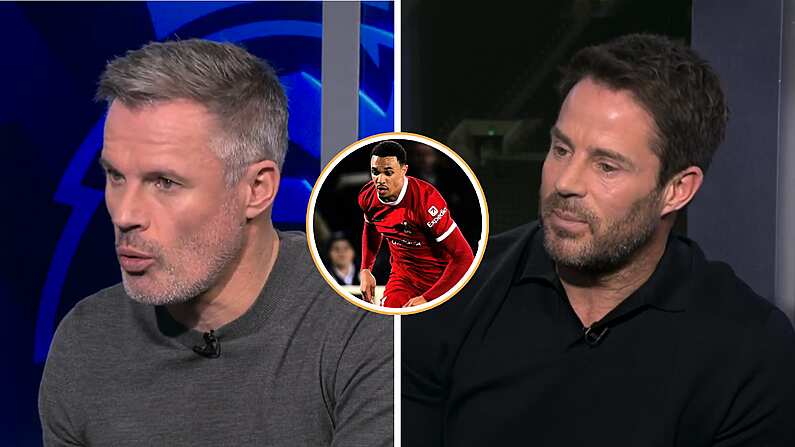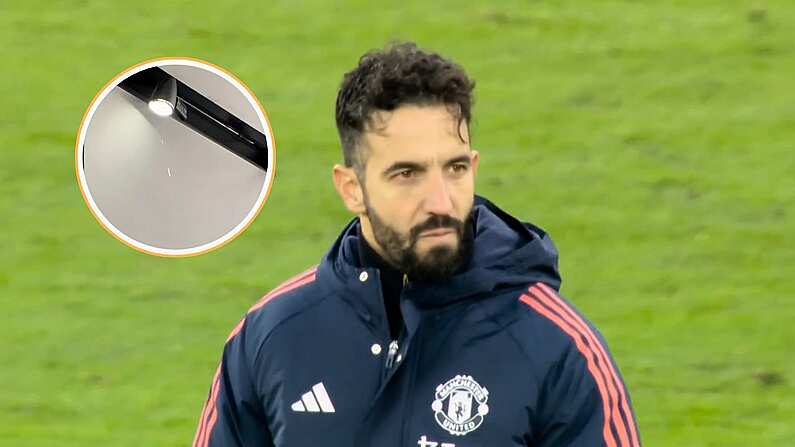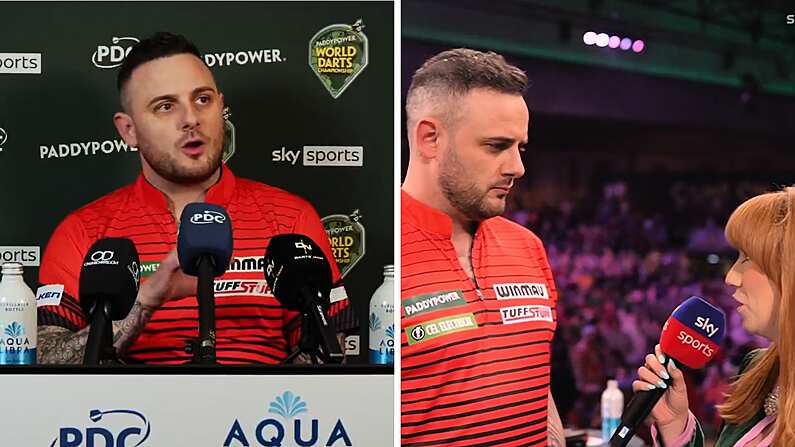Computers are useless, wrote Picasso, as they can only give you answers. By extension, Picasso would argue that if there is any inherent value in books, it lies in their ability to provide questions. It is unknown whether Adrian Doherty liked Picasso, but considering he included Tolstoy, Dylan and French Existentialism among his interests, it would be thoroughly unsurprising if he did.
Doherty is the subject of a new book by Oliver Kay entitled Forever Young The Story of Adrian Doherty: Football's Lost Genius, which delves deep into the story of a youngster from Strabane who was believed to be the first of 'Fergie's Fledglings'. Doherty was absurdly talented, and broke through the ranks at United along with Ryan Giggs, with whom he was considered to be at least as good as, if not better.
We spoke to Oliver about his new book on our podcast, The Racket, which you can listen to below:
Doherty grew up in Strabane during the Troubles, although that did not prevent him from developing his talent for football with the singular effort of a man determined to be a professional footballer. Doherty was the archetypal free-spirit, a young lad not in any way contaminated by the warzone in which he grew up in. One evocative image from Kay's book sees Doherty go off training on his own around Strabane, with a friend following a few minutes later to see British soldiers had put down their guns in order to join in.
The strange paradox is that Doherty would work himself tirelessly to develop his footballing talent - he would do sprints around cans of Coke late at night to develop his speed - despite the fact that, at times, he did not appear remotely bothered by the idea of being a top class footballer. Doherty fell for music - Bob Dylan was his idol -, and when he was given a contract at Manchester United, would not use his free Old Trafford tickets, instead busking on the streets of Manchester. While he played football during the day, in the evening he would read voraciously: by the time he was 17 he had read Dante, Poe, Tolstoy and - to feed his deep interest in theology - the Koran.
His unfettered self became increasingly alienated by life as a Manchester United youth; a long day of militaristic regimentation involving the same long runs along with menial tasks like cleaning the pro's boots along with pumping footballs. Doherty craved solitude away from the hedonistic madness of the dressing room and the youth players' digs, which became theatres for initiation ceremonies that bordered on the sinister. New youth team players would be forced to perform various acts of crass depravity and utter humiliation in front of each other, which included simulating sex on the massage table; being held down and having footballs pelted at them; being stripped naked and thrown in a tumble-dryer. These, as Paul Scholes told Kay, were aimed at "toughening you up mentally".
At no stage did Doherty recount revulsion or horror at these ceremonies, but you could not think of a man further removed from this fundamentally weird concept. Just because something is traditional doesn't make it normal. All of the players who became the famed Class of '92 went through these rituals, and all recount it with a kind of nostalgia interposed with a necessary retrospective horror.
In many ways, their success at United was entirely normal. These were local players who at least had the release of their family homes in the evening, but were all motivated by the same concepts that motivated by a sense of insecurity most young British men felt: driven primarily by a fear of failure. Kay writes that notoriously demanding and manipulative first-team coach Eric Harrison found it easy to coach the likes of the Nevilles, Giggs and Scholes as they were motivated in the same way as he was. With Adrian Doherty, however, Kay believes that Harrison, the "master of pressing buttons did not know which buttons to push with Adrian".
Doherty's extraordinary talent meant he was impossible to ignore, and was given dispensation by Ferguson and Harrison, most notably in a four-week leave of absence to alleviate homesickness. He returned to United and was ultimately offered a contract by the club, and his negotiating stance was extraordinary.
As Kay writes, Ferguson invited Doherty into his office to offer him a five-year contract. Doherty turned it down, asking if it were possible just to be given a contract for one year, maybe two. They eventually compromised on three, with Doherty saying afterwards that he didn't know whether he would still want to be a footballer in five years time.
In an interview after he was given the contract, he was asked a fairly typical question regarding his ambitions at United. His answer was atypical: "I'd like to finish my book". Doherty had bought a typewriter with his first win bonus (a member of the travelling squad for a senior game at Southampton) and had begun writing an absurdist novel entitled The Adventures of Humphrey and Bodegard", whose first page is dedicated to the latter "searching for the meaning which would tie everything together".
One can only imagine what Ferguson would make of a youth-team player considering any meaning beyond a commitment to win him trophies; Jaap Stam was flogged for comments far less heuristic in his book. There was a feeling among some at the time that Ferguson, while undoubtedly in thrall to his talent, felt slightly unsure he was mentally prepared. According to the book, Ferguson is known to have said "you can't play for the first team on Saturday and go busking on a Monday". Kay is sure he was going to make it at Old Trafford, and he should have made his debut against Everton before Giggs, only for injury to strike at the worst possible time:
I know he would have been in the first team, I knew there were times when he [Ferguson] went a little bit cautious with Doherty, feeling he needed to slow this down; that he may be ready as a player, but maybe not as a man. Pete Smyth, one of his teammates, felt that Ferguson was holding him back a small bit. Yet, when the injury happened, he would have been in the first-team. He would have played in the first-team within a week.
Everyone seems to be the opinion that if he had played in the first team squad he would have done really really well. My feeling is that he would have set Ferguson man-management challenges that even Ferguson would not have known how to handle.
Eric Harison, who was the youth-team coach at the time was a master of pressing buttons, but he didn't know what buttons to press with Adrian because he wasn't motivated in the same way. He didn't have that desperation to win trophies, he wasn't motivated by a fear of failure.
Doherty did his cruciate knee ligament days before he was slated for his debut against Everton. He hobbled off, and a spot opened up for Giggs. Doherty suffered another breakdown in his first game back in over a year, and ultimately took two years to recover, returning as a 19 year old shorn of the pace and confidence he once had. His return to form became just before the end of his contract, and was released by United. He lived a peripatetic existence from thereon, working in a chocolate factory and a hotel in Galway, where he briefly pondered the absurdity of the list of past employers on his CV.
By contrast, Ryan Giggs made his debut in Doherty's stead, and the rest is history.
Although not in Doherty's case. The story of Adrian Doherty has largely been left untold until now. Doherty tragically drowned in a canal in The Hague, passing away the day before he turned 27. Ryan Giggs had won the treble with Manchester United months previous.
Kay's book is terrific, doing justice to Doherty the man, interpolating the story with poems and stories written by the man described as 'Bob Dylan wearing No.7'.
To read it is to ponder many questions. What would Doherty have been if he had made it? And how would Ferguson have handled it? He had been suspicious of David Beckham expressing himself through his haircuts in the past, what might he have made of a winger who spent his days off imitating Bob Dylan in Manchester City Centre? The likelihood is that Ferguson would have found a way to understand, because Doherty was so talented.
When Kay himself is asked if he had the chance to ask Doherty one question, he takes time to answer. Eventually, he responds: "I would love to know what was said between him and Ferguson the day it all ended with United".
Oliver Kay is the Chief Football writer with The Times. His book is entitled Forever Young The Story of Adrian Doherty: Football's Lost Genius, is published by Quercus and is on sale now.
See Also: Why Jose Mourinho Is About To Remind Manchester United What They Are All About
See Also: A Man United Fan Emails From The Future To Explain What Happened After Mourinho Took Over










